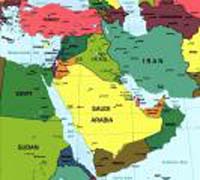NATO ministers seeks closer ties with Middle East - 10 February, 2006 - News
NATO defense ministers on Friday will seek to calm Islamic anger over the Prophet Muhammad cartoons at their first meeting with counterparts from Israel and six Arab nations. "Deescalation is the message we have today," German Defense Minister Franz Josef Jung said. "We need to make clear how important it is to have a dialogue between cultures."

The NATO ministers will also aim to relaunch a drive to modernize the alliance to confront new threats highlighted this week by attacks on its peacekeepers in Afghanistan by Muslim protesters enraged by the publication of the caricatures in European newspapers.
The meeting with NATO's "Mediterranean partners" was called before the cartoon controversy broke to focus on counterterrorism cooperation in North Africa and the Middle East . The theme was also taken up in a separate meeting NATO held with Russian Defense Minister Sergei Ivanov who sent a warship to Sicily so Russian sailors could train with their NATO counterparts in preparation for their planned participation later this year in joint anti-terrorist patrols in the Mediterranean Sea.
On the opening day of their meeting Thursday, the NATO ministers expressed their determination to expand the alliance's security mission in Afghanistan despite the violent protests over the cartoons. "There is full commitment to take forward (the peacekeeping force's) expansion into the southern provinces this summer," NATO Secretary General Jaap de Hoop Scheffer told a news conference. "That commitment will not waver."
NATO is preparing to expand its Afghan mission from 9,000 to 16,000 troops and move into the more dangerous southern region patrolled by U.S. forces. De Hoop Scheffer said there would be no change in the plan to send about 300 Danish troops to the south, although the Scandinavian nation has borne the brunt of Islamic outrage over the cartoons, first published in a Danish newspaper in September.
The increasingly diverse nature of NATO's operations, which in recent months included training Iraqi troops in Baghdad, peacekeeping in Kosovo and Afghanistan, backing African peacekeepers in Sudan and delivering humanitarian aid to Louisiana and Pakistan, have underscored the need to modernize an alliance created to defend Europe from a Soviet attack.
"NATO today faces greater threats to its long-term future than it ever did at the height of the Cold War," British Defense Secretary John Reid said. "Now is the time to replace immobile armies with more flexible, rapid response forces."
Ministers will seek to fill gaps in troop contributions to the elite NATO Response Force that are threatening to delay the plan for it to be fully ready by November.
They will also aim to overcome differences over the type of mission that the highly mobile force of 25,000 should undertake. France says the NRF should not be routinely used for humanitarian or peacekeeping missions, but be kept back for large-scale military operations. Funding will also be on the agenda. U.S. Defense Secretary Donald H. Rumsfeld is likely to press European's to boost defense spending, reports the AP.
N.U.
Subscribe to Pravda.Ru Telegram channel, Facebook, RSS!





